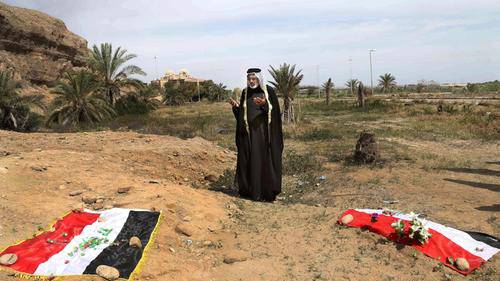
Islamic State terrorists committed seven international crimes in Camp Speicher massacre
A war crimes probe has concluded that ISIS committed seven types of international crimes during the camp Speicher massacre that occurred six years ago, the UN Security Council was told on Monday.
The mass killing, in which an estimated 1,700 unarmed, predominantly Shiite soldiers from Camp Speicher – a former US base outside the city of Tikrit – were killed, became a symbol of the insurgent’s brutality against Iraqis.
The UN team known as Unitad, which was set up in 2017 to hold ISIS accountable for its crimes, says its information gathering has increased significantly in the past six months due to advanced technology.
“Unitad categorises seven types of international crimes committed by ISIS against innocent Iraqis during the Camp Speicher massacre,” Karim Khan, the head of the team said during a virtual UN session.
“We remember the victims and remain committed to investigate the incident, collect evidence and build case files in line with international standards to support courts in Iraq to hold criminals accountable and bring justice to victims,” Mr Khan said.
Images of soldiers, who were shot dead in their hundreds, were posted online by ISIS and ranked as one of the deadliest single acts of bloodshed during the last decade of conflict in Iraq.
The fall of Tikrit in 2014 was part of the ISIS onslaught that stunned Iraqi security forces and the military, which melted away as the militants advanced and captured key cities and towns in the country’s north and west.
As the news spread, 3,000 soldiers from all over Iraq were ordered by their superiors to change in to civilian clothes and to leave the camp.
Those carrying weapons were told to leave them behind.
Many of the soldiers were captured by the insurgents, who took them to various locations around Tikrit and executed them one by one.
Videos showed masked gunmen bringing the soldiers to a bloodstained concrete river waterfront inside the presidential palace complex in Tikrit, shooting them in the head and throwing them into the Tigris River.
Mr Khan said that the key next step of the “legal characterisation” of crimes will be demonstrated through forensic evidence.
“All crimes will be accounted for,” he said.
Mr Khan said the team’s task is not to uphold the “memory of tragedies” but to create the evidence base for independent and fair criminal trials.
Source: The National





